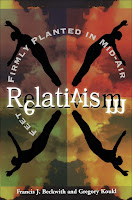The Programming of Life is an incredible book in which author Donald E. Johnson identifies several connections between modern information theory/systems and biochemistry. He argues by analogy and the process of elimination that these systems are all the work of a mind. Click the link above to read my full chapter-by-chapter review. Here are some of my favorite quotes from the book:
"Laws of chemistry and physics which follow exact statistical, thermodynamic, and spatial laws, are totally inadequate for generating complex functional information or those systems that process the information using prescriptive algorithmic information. Unfortunately, most people investigating origins are unfamiliar with the immensity of the problems, and believe that time, chance and natural selection can accomplish almost anything."
"One cannot use the information of life to 'prove' that information can arise purely from physicality, as that would simply be a tautology based on the assumption of life from physicality. In examining any complex functional information where the source of the information is known, it invariably (no known exceptions) resulted from a source other than chance and/or necessity."
"Those who insist on purely physical causes of life are in an untenable position when it comes to known science. Not only can they not prove that it's possible (non-zero probability) for life to come about by the physical interactions of nature, but the information content of life precludes that possibility."

"In each cell, there are multiple operating systems, multiple programming languages, specialized communications systems, encoding/decoding hardware and software, error detection and correction mechanisms, specialized input/output channels for organelle control and feedback, and a variety of specialized 'devices' to accomplish the tasks of life."
"It is important not only to transmit the messages reliably...from the DNA, but the enzymes and ribosomes must already know how to interpret that coded information in order for proteins (including enzymes), RNA, and replicated DNA to be manufactured appropriately (functional criteria)."
"The challenge for a purely physical origin of such a cybernetic complex interacting computer system is the need to demonstrate the rules, laws, and theories that govern electronic computing systems and information don't apply to the even more complex digital information systems that are in living organisms."
For further reading on this topic, I highly recommend these books:




